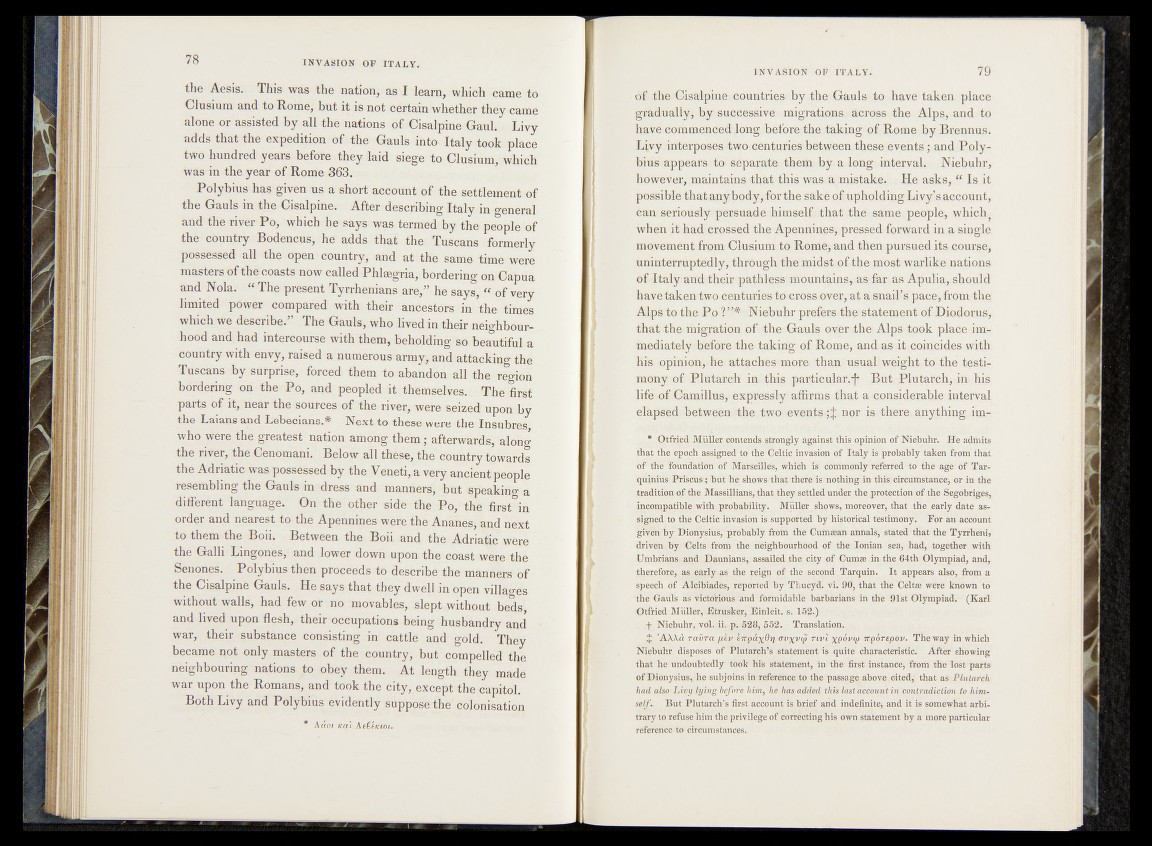
the Aesis.- This was the nation, as I learn, which came to
Clusium and to Rome; but it is not certain whether théy came
alone or agisted by all the nations of Cisalpine Gatufov Livy
adds that the expedition of the Gauls into Ita ly toot place
two hundred yearn before they laid siege- to Clusium, which
was in the year of Rome 363.
Polybius has given us a short account of the settlement of
the Gauls in the Cisalpine. After describing Italy in general
and the river Po, which he aays was termed fey the people o f
the country Bodencus,- he adds that the; Tuscans formerly
possessed all the open country, and a t the same time were
masters of thecoasts now calledPhlægria, bordering on Capua
and Mela. “ The present Tyrrhenians are,’’, he says',' “ of very f
limited power compared with their ancestors in. the times
which we describe.” The Gauls, who lived in their neighbour-1
hood and had intercourse with them, beholding so beautiful à
country with envy, raised a numerous army,, and attacking the
Tuscans by surprise, forced them to abandon all th e ‘.’region
bordering on the Po, and peopled it themselves.t The first
parts of it, near the sources of the river, wereseized upon by
the Laians and Lebecians.* Next to these:were the Insulàè&î
who were the greatest nation among them ; a fte rw à rd ^ lo d i
the river, the Cenomani. Below all thèse, the’country towards
the Adriatic was possessed by the Veneti, a very ancient-people
resembling the Gauls in dress and manners, but speakino- a
different language.“ On the other side the Po, the first in
ordçr and nearest to the Apennines were the Anancss, and next
to them the Boii. Between the Boii and the Adriatic were
the Galli Lingories, and lower down upon the coast we?e-the
Senones. Polybius then proceeds to describe the manners of
the Cisalpine Gauls. He says that they dwell in open villages
without walls, had few or no movables, slept without beds
and lived upon flesh, their occupations being husbandry and
war, their substance consisting in cattle and gold*. Thfey
became not only masters of the country, but compelled the
neighbouring nations to obey them. At length they made
war upon the Romans, and took thç city, except the capitol.
Both Livy and Polybius evidently suppose the' colonisation
../Aidât Kq};Äs
of the ?Cisâlpine ^countries I by . the* Gaul s to have’taken place
gÄduallypbyisj&gp^s'sjive migrations äcross the Alps, and to
have WDmmenoesd^ldhg'foe'fofejthe taking ©f Rome byBrennus.
Lj,vy ênterpoees éW'Cèntpries-bètween these events ; and Polybius
appeaffissita s#par$tte them- by. a long interval. Niebuhr,
hbwe^er, maintainf'tfeat this a% mistake.' He asks, “ Is it
possible thatany body/Io-Bthe sake of;upholding Livy’s account,
can seriously persuadeihimself^that'.thè^same » people, which?
when it hadi crossed the Apennines*^pressed .forward in a single,
movementfrtom Clusium, to Rorne^ and then pursued its course,
uninterruptedly, through the midst, oftlje mosfwarlike nations
of dtal|fi and-their pa thtegs^moun,tains, 9.6« far, as Apuii^shquW
have taken-two centuanesfto cross over, at a: spail’s pace^ ,from the
Alps tp^hesi$Qf<^l% Niebuhr prefersthe?statement ofDio,do,ruS,,
that the’ fiiigrationc of the Gauls ©vier ,thei Alps took place im-
mediatelylbfefdre the taking of Rome,-and as it coincides with
his:iOplniofo-"hewatt^ches more than-“nsualfweight to the.testi-
mony of P 1utarch in.Äis p a rtic u la r.B u t-P lu ta rc h ) in his
life?of Camillus, expressly* affirms that a/cousidepfele interval
^lapsed ^between;efc he, t w<f|$veftts>;J. nor is- there? .anything im-
* Otfried, Müller contends strongly against this opinion of Niebuhr. He admits
that the epoch assigned to the Celtic invasion of Italy Is probably taken from that
ôir‘the xoundamon of Marseilles, which is commonly deferred “to the age of Tar-
^[Ulfiitis' Priscus ; but he shows that there is nothing- hot this circumstance, or in the
tradition of the Massillians, that they settled under the protection of the Segobriges,
incompatible with probability. Muller shows, moreover, that the early date assigned
to the .Ceiticmvasion is supported by historical testimony. For an account
given by Dionysius, probably from the Cumsean annals, stated that the Tyrrheni,
drivfeh by Ufelts from the neighbourhood of the Ionian sea, had, together with
Umbrians, apd Daunians,. assaüéd the,,.ç(ty of Gumæ in the 64th Olympiad, and,
therefore, as early as thé reign of the second Tarquip. It appears also, from a
speech of Alcibiades, reported1 by Thucyd. vi.'90, that the Céltæ' were known to
the Gauls as victorious and fbrmidablè' barbarians in the 9lst Olympiad. (Karl
©tfried Müller* Etrasker, Eipleifc k.
■)- /Niebuhrj vol. ii. p. 528, Translation,
'AWà ravra pkv <TV%vq> tivi XP°vtg irpórepov. The way kt which
Niebuhr disposes of 'Plutarch’s statement is quite characteristic. After showing
that he undoubtedly took hfs statement, in the firât instance, from the lost parts
of Dionysius, he subjoins1 in reference to the passage above ,cited, that as Plutarch
had, also Livy tying before him, he has added this last account in contradiction to himself.
But Plutarch’s first account is brief and indefinite, and it is somewhat arbitrary
to refuse him the privilege of correcting his own statement by a more particular
reference to circumstances.